Traditional Korean Philosophy
East Asian Comparative Ethics, Politics and Philosophy of Law
Series Editors
Philip J. Ivanhoe, Chair Professor of East Asia Comparative Philosophy and Religion and Director of the Center for East Asian and Comparative Philosophy (CEACOP) at City University of Hong Kong;
Sungmoon Kim, Associate Professor of Political Theory at City University of Hong Kong;
Eirik Lang Harris, Assistant Professor of Philosophy at City University of Hong Kong.
East Asian Comparative Ethics, Politics and Philosophy of Law. This series publishes path-breaking and field-defining works in East Asian comparative philosophy with a special interest in works of normative and applied ethics, political theory and philosophy of law.
Confucianism, Law, and Democracy in Contemporary Korea , edited by Sugmoon Kim
Traditional Korean Philosophy: Problems and Debates , edited by Youngsun Back and Philip J. Ivanhoe
Traditional Korean Philosophy
Problems and Debates
Edited by
Youngsun Back and Philip J. Ivanhoe

London New York
Published by Rowman & Littlefield International, Ltd.
Unit A, Whitacre Mews, 26-34 Stannary Street, London SE11 4AB
www.rowmaninternational.com
Rowman & Littlefield International, Ltd. is an affiliate of Rowman & Littlefield
4501 Forbes Boulevard, Suite 200, Lanham, Maryland 20706, USA
With additional offices in Boulder, New York, Toronto (Canada), and Plymouth (UK)
www.rowman.com
Selection and editorial matter 2017 by Youngsun Back and Philip J. Ivanhoe
Copyright in individual chapters is held by the respective chapter authors.
All rights reserved . No part of this book may be reproduced in any form or by any electronic or mechanical means, including information storage and retrieval systems, without written permission from the publisher, except by a reviewer who may quote passages in a review.
British Library Cataloguing in Publication Data
A catalogue record for this book is available from the British Library
ISBN: HB 978-1-78660-185-8
PB 978-1-78660-186-5
Library of Congress Cataloging-in-Publication Data
Names: Back, Youngsun, 1974 editor. | Ivanhoe, P. J., editor.
Title: Traditional Korean philosophy : problems and debates / edited by Youngsun Back and Philip J. Ivanhoe.
Description: New York : Rowman & Littlefield, 2017. | Series: East Asian comparative ethics, politics and philosophy of law | Includes index.
Identifiers: LCCN 2016029592 (print) | LCCN 2016035271 (ebook) | ISBN 9781786601858 (cloth : alk. paper) | ISBN 9781786601865 (pbk. : alk. paper) | ISBN 9781786601872 (electronic)
Subjects: LCSH: Philosophy, Korean. | Buddhism. | Philosophy, Confucian.
Classification: LCC B5251 .T73 2017 (print) | LCC B5251 (ebook) | DDC 181/.119dc23
LC record available at https://lccn.loc.gov/2016029592
 The paper used in this publication meets the minimum requirements of American National Standard for Information SciencesPermanence of Paper for Printed Library Materials, ANSI/NISO Z39.48-1992.
The paper used in this publication meets the minimum requirements of American National Standard for Information SciencesPermanence of Paper for Printed Library Materials, ANSI/NISO Z39.48-1992.
Printed in the United States of America
Contents
Halla Kim
Yung Sik Kim
Hyoungchan Kim
Young-chan Ro
Richard Kim
So-Yi Chung
Soon-woo Chung
Youngsun Back
Sungmoon Kim
Jin Y. Park
of this volume. It first appeared in International Philosophical Quarterly 55.4 (December 2015): 43756.
For the first occurrence of citations in the footnotes, the full reference is given. For subsequent citations, an abbreviated reference to the work is provided. A full list of works cited is provided at the end of the volume.
For the first occurrence of Chinese, Korean, or Japanese names, we provide the Romanization in the relevant language, followed by the Chinese characters, for example, Zhu Xi ; Cheondo ; Buky . We follow the guidelines of the Revised Romanization of Korean, first promulgated by the Korean Ministry of Culture and Tourism in 2000, with certain exceptions. For instance, for some modern Korean surnames, such as , , , , , , we use Kim, Shin, Kang, Park, Lee, and Ahn, instead of the Revised Romanization, to match common usage. However, for the surnames of premodern figures, we always employ the Revised Romanization system: for example, Bak instead of Park, Yi instead of Lee, and so on. In the references, we include Korean characters for the names and the titles of the works of contemporary Korean scholars.
The words , pronounced qi in modern Mandarin and gi in Korean and ki in Japanese, , pronounced yin in modern Mandarin, eum in Korean, and on in Japanese, and , pronounced yang in modern Mandarin and Korean and y in Japanese, are the names of different kinds of fundamental constituents of the phenomenal world. We leave these three words Romanized in Pinyin and untranslated since there is no single English word corresponding to their meanings, and these words, like Sanskrit karma , are becoming parts of the English lexicon.
We have standardized the translation of key terms of art such as Way ( Dao ), Supreme Ultimate , principle , heart-mind , Heart-mind of the Way , and Human Heart-mind , in order to make comparison among the contributions easier for English readers. Some authors will at times translate these terms differently and when they choose to do so their choice is made clear. Authors have chosen to translate the term as Four Sprouts or Four Beginnings.
1. TRADITIONAL KOREAN PHILOSOPHY
For the purposes of this volume, we adopt a genealogical and thematic rather than a primarily temporal definition of traditional Korean philosophy; we mean by this, roughly, philosophical reflection that was done by Korean thinkers informed and inspired primarily by local or imported traditions of Buddhism and Confucianism. A wide range of indigenous Shamanistic beliefs and practices evolved in the course of Korean history and came to be interwoven with Daoism and Buddhism as well as continuing as an independent tradition still practiced today.
The exact date of Confucianisms arrival is not clear but it first reached Korea along with Buddhism some time during Three Kingdoms period. It initially attracted the attention of certain elites but did not exert a significant influence on Korean thought and culture until much later, when new Neo-Confucianism expressions of the tradition were brought back to Korea from Song dynasty China. Confucianism came to play a pervasive and dominant role in Korean thought and culture in the course of the Joseon dynasty. The dynasty was established by Yi Seonggye (13351408), who subsequently was declared King Taejo (r. 13921398), with the direct and active support of a group of dedicated Confucian officials. Together, they quickly ensured the new regime would take up and defend the Confucian tradition as its guiding ideology and cultural mainstay. As Michael C. Kalton notes, this made the Joseon dynasty, the first and only East Asian regime to be established under exclusive Neo-Confucian auspices. and quickly came to see themselves as the most pure and committed followers and defenders of the Confucian tradition. This had a number of profound consequences for the shape and direction of the Confucian tradition in Korea, many of which serve as central themes in the contributions to this volume.
2. THE AIMS OF THIS VOLUME AND ITS CONTRIBUTIONS
Unlike most works on traditional Korean philosophy, this volume is not focused on exploring the work of a particular thinker or school or offering a general introduction or historical survey of Korean philosophy. Instead, our aim is to provide a sampling of contemporary philosophers writing on different problems, figures, debates, or periods that are important and helpful for understanding the course, development, content, and style of traditional Korean Buddhist and Confucian thought. Some of our contributors look back to earlier Chinese sources, thinkers, or ideas or to Japan for corresponding philosophical ideas or arguments that offer helpful comparison or contrast to the Korean case. In any event, the purpose is to present different representative examples of Korean philosophers at work, grappling with the some of the many problems they found most pressing and vexing.
Next page
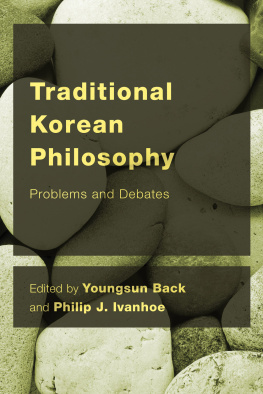
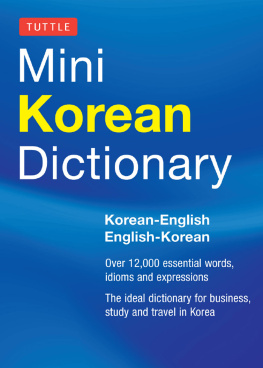
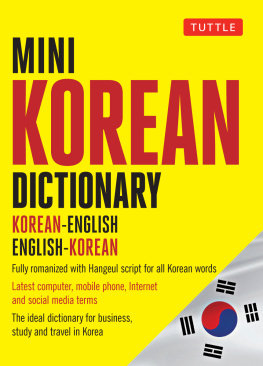
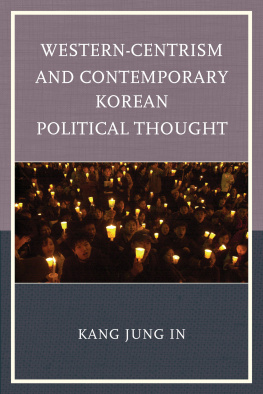


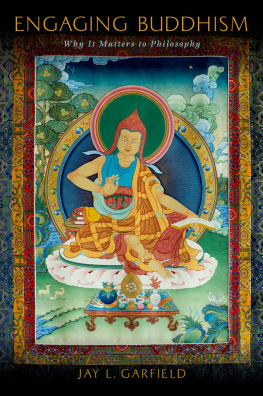
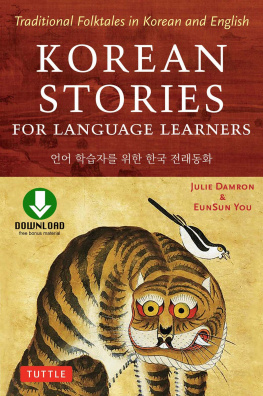

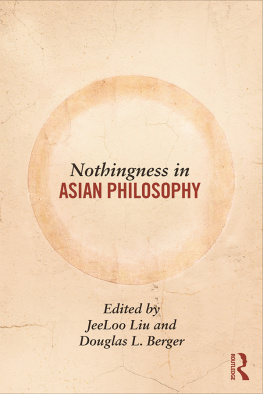

 The paper used in this publication meets the minimum requirements of American National Standard for Information SciencesPermanence of Paper for Printed Library Materials, ANSI/NISO Z39.48-1992.
The paper used in this publication meets the minimum requirements of American National Standard for Information SciencesPermanence of Paper for Printed Library Materials, ANSI/NISO Z39.48-1992.